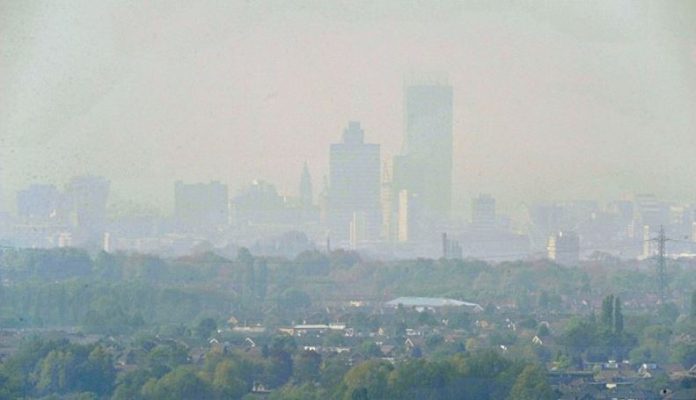New study out today shows 1.6 million life years will be lost in Greater Manchester in the coming century due to air pollution if leaders don’t take urgent action.
That’s the equivalent to everyone in Greater Manchester having their life expectancy cut by 6 months while the region has the highest rates of emergency admissions to hospital for asthma in the whole country.
The report by the think-tank for the North of England, IPPR North also found that air pollution is costing the Greater Manchester economy £1 billion annually.
Ahead of the National Clean Air Summit, a ground-breaking new report- Atmosphere: Towards a proper strategy for tackling Greater Manchester’s Air Pollution sets out the human and the economic cost of lethal and illegal air pollution levels.
It commissioned brand new analysis from global experts at Kings College London to reveal the extent of Greater Manchester’s invisible killer.
The research found that Manchester ranks as the second worst council in England for ‘PM10’ pollution which is linked to conditions such as lung cancer and asthma.
‘Hotspots’ for dangerous air quality include Manchester’s Oxford Road, which exceeded legal limits 90 times during 2016.Of all the CCG areas in England, Central Manchester is the worst in the country for emergency admissions to hospital for asthma at more than double the national average. North Manchester comes in second place.
The report finds that Greater Manchester faces a similar air pollution challenge- caused principally by transport emissions- to London but with neither the powers nor the strategies to tackle it.
Shockingly, Greater Manchester has one of the worst polluting bus fleets of any city in the UK. In fact, 20% of the fleet is made up of the worst kind of polluting vehicle types (compared to just 10 percent in London), and only 15 buses are entirely electric, compared to over 500 in London.
The report calls on Mayor Andy Burnham to make new pledges to speed up plans to clean up Greater Manchester’s toxic air. These include urgent action to transform Greater Manchester’s out-dated bus fleet and the setting up a Clean Air Taskforce for Greater Manchester to drive changes as fast as possible, including urgent consideration of a clean air charging zone.
In return, it calls upon government to give Greater Manchester the powers and funds necessary to make faster progress including a Clean Air Devolution Deal to pay for improved public transport, electric vehicle charging points and other incentives for green travel in the city and a national, targeted diesel scrappage scheme to help drivers switch to electric vehicles.
There should also be a comprehensive national strategy that mandates agencies such as Highways England and Network Rail to work more effectively with local councils to deliver real change.
Director of IPPR North, Sarah Longlands said:
“The human cost of this air pollution crisis to Greater Manchester cannot be overstated. People’s lives are being cut short, our children’s health is being put at risk and this is before you even consider the £1bn annual economic burden that poor quality air places on the local economy.
“For too long, the debate on air pollution has been focused on London. But now for the first time, we understand the full extent of the problem in Greater Manchester. We simply cannot allow this to continue.
“There must be no delay. We need to see immediate and ambitious action from Government and from local leaders, including a Greater Manchester Clean Air Devolution Deal, as part of a Clean Air Fund and diesel scrappage scheme”.
Alison Cook, Director of Policy at the British Lung Foundation, said:
“Air pollution is a threat to us all. Children, the elderly and people with a lung condition are the most vulnerable. Breathing in dirty air is linked to lung cancer, asthma, heart disease and stroke. It can also stunt children’s lung development, leading to chronic health problems later in life.
“Greater Manchester is one of the most polluted areas in the UK. This report provides more detail on the health impact of air pollution on the city than we’ve had before. Ambitious and concrete measures from the Mayor and central government must now follow, such as rolling out charging Clean Air Zones in the most polluted areas.”
ClientEarth Senior Campaigner Andrea Lee said:
“This report highlights the damage caused by illegal and harmful levels of air pollution and makes worrying reading for people living and working in Greater Manchester.
“While the UK Government continues to drag its feet over its legal and moral duty to meet legal limits of air pollution in the shortest time possible, it is essential that local and regional leaders, including the Mayor of Greater Manchester, do everything they can to protect people’s right to breathe clean air.”







